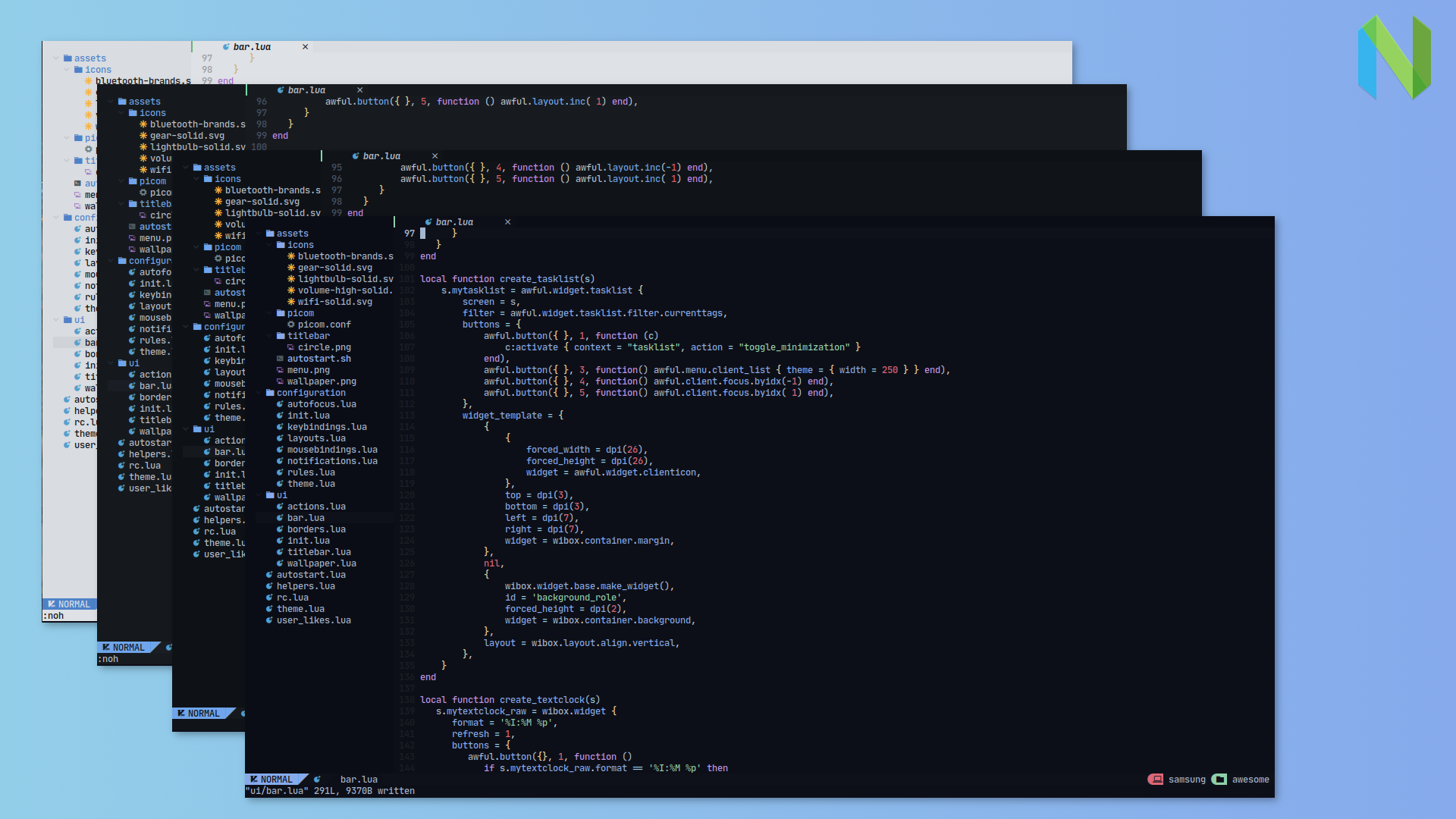This is a port of the Decay Colorscheme for neovim using lua.
- Telescope
- Nvim Tree
- Tresitter
- Lsp
- Lsp saga
- Coc
- Bufferline
- Illuminate
- Diff
- Git signs
- Git gutter
- Lualine
- Indent-BlankLine
You can use many packages managers available out there, such as packer.nvim, lazy.nvim, etc.
Use the next lua code as reference.
{
"decaycs/decay.nvim",
name = "decay",
lazy = false,
priority = true,
config = function ()
-- SNIP
end
}Grab the following snippet.
use {'decaycs/decay.nvim', as = 'decay'}Then execute :PackerInstall or :PackerSync to install decay.
Include this in your configuration.
Plug 'decaycs/decay.nvim', { 'as': 'decay' }To enable the theme you can use the vim.cmd.colorscheme function or vim.cmd [[ colorscheme * ]] if you're using
an older version of neovim.
So being the available palettes: dark decay, default decay, light decay, and decayce, you can do:
vim.cmd.colorscheme "decay-dark"
vim.cmd.colorscheme "decay-light"
vim.cmd.colorscheme "decay-default"
vim.cmd.colorscheme "decayce"You can customise decay behavior by using the .setup function and also calling the colorscheme setting.
local decay = require("decay")
local opt = vim.opt
local cmd = vim.cmd
opt.background = "light"
decay.setup({
style = "default",
-- enables italics in code keywords & comments.
italics = {
code = true,
comments = true,
},
-- enables contrast when using nvim tree.
nvim_tree = {
contrast = true
},
})
cmd.colorscheme "decay"Note that in this example we've used "decay" as colorscheme instead of "decay-STYLE"... This is
because we're already setting the style with the .setup method instead.
Tip
Using vim.opt.background enables light decay! no matter what palette you've choosen.
Setting background is always recommended though, even to "dark", so, be careful.
By default this theme will create some kind of highlighted blocks in the cmp menu, but you can disable them by adding the following code snippet in your setup block.
require('decay').setup {
-- SNIP
cmp = {
block_kind = false,
},
}If you use lualine, you can enable the integration with this:
require('lualine').setup {
options = {
theme = 'decay',
},
}You can fetch the colors of a specific palette by using the core module.
local core = require 'decay.core'
-- style could be: default, dark, decayce or cosmic (experimental).
-- note that if vim.opt.background is light, even setting the palette will
-- anyways return the light palette.
local STYLE = "dark" -- e.g
local colors = core.get_colors(STYLE)
print(colors.background) -- shows the background of the selected palette!You can override certain highlights according to your needs, take the next code as reference to do so.
local decay = require("decay")
local core = require("decay.core")
-- choose an style to fetch the colors
local STYLE = "decayce"
local colors = core.get_colors(STYLE)
decay.setup({
style = style,
cmp = { block_kind = false },
nvim_tree = { contrast = true },
italics = {
code = true,
comments = true,
},
-- overriding the `@property` highlight used by treesitter and using the red color instead.
override = {
["@property"] = { fg = colors.red },
}
})And if you want, you can also override the palette instead of specific highlights, e.g:
local decay = require("decay")
local core = require("decay.core")
-- chose a decay style.
local STYLE = "decayce"
local colors = core.get_colors(STYLE)
decay.setup {
style = style,
cmp = { block_kind = true },
nvim_tree = { contrast = true },
italics = {
code = true,
comments = true,
},
palette_overrides = {
background = "#191C1C",
contrast = "#161919",
statusline_bg = "#222626",
lighter = "#2f3434",
foreground = "#B1CCC9",
cursorline = "#2f3434",
comments = "#3F4947",
cursor = "#B1CCC9",
black = "#2D3130",
red = "#e88693",
green = "#4FDAD1",
yellow = "#ecd3a0",
blue = "#97b1e2",
magenta = "#caabe6",
cyan = "#93cee9",
white = "#cbced3",
brightblack = "#2f3434",
brightred = "#e88693",
brightgreen = "#4FDAD1",
brightyellow = "#ecd3a0",
brightblue = "#97b1e2",
brightmagenta = "#caabe6",
brightcyan = "#98d3ee",
brightwhite = "#B1CCC9",
accent = "#4FDAD1",
}
}![TIP] Check core.lua to see an actual list of attributes specifying palette colors when using
palette_overrides.
